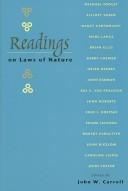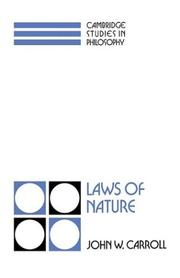| Listing 1 - 6 of 6 |
Sort by
|

ISBN: 082295852X 9780822958529 Year: 2004 Publisher: Pittsburgh, Pa University of Pittsburgh Press
Abstract | Keywords | Export | Availability | Bookmark
 Loading...
Loading...Choose an application
- Reference Manager
- EndNote
- RefWorks (Direct export to RefWorks)
Science --- Philosophy. --- Science - Philosophy. --- Philosophy of nature --- Philosophy of science

ISBN: 0521433347 0521064139 0511619901 9780521433341 9780511619908 9780521064132 Year: 1994 Publisher: Cambridge Cambridge University press
Abstract | Keywords | Export | Availability | Bookmark
 Loading...
Loading...Choose an application
- Reference Manager
- EndNote
- RefWorks (Direct export to RefWorks)
John Carroll undertakes a careful philosophical examination of laws of nature, causation, and other related topics. He argues that laws of nature are not susceptible to the sort of philosophical treatment preferred by empiricists. Indeed he shows that emperically pure matters of fact need not even determine what the laws are. Similar, even stronger, conclusions are drawn about causation. Replacing the traditional view of laws and causation requiring some kind of foundational legitimacy, the author argues that these phenomena are inextricably intertwined with everything else. This distinctively clear and detailed discussion of what it is to be a law will be valuable to a broad swathe of philosophers in metaphysics, the philosophy of mind, and the philosophy of science.
Law (Philosophy). --- Philosophy of nature. --- Philosophy of nature --- Mathematical logic --- Philosophy of science --- Law --- Philosophy --- Law (Philosophy) --- Causation --- Nature --- Nature, Philosophy of --- Natural theology --- Arts and Humanities --- Law - Philosophy
Book
ISBN: 0521533686 0521826292 9780521533683 9780521826297 Year: 2010 Publisher: Cambridge Cambridge University Press
Abstract | Keywords | Export | Availability | Bookmark
 Loading...
Loading...Choose an application
- Reference Manager
- EndNote
- RefWorks (Direct export to RefWorks)
This book is an accessible introduction to the central themes of contemporary metaphysics. It carefully considers accounts of causation, freedom and determinism, laws of nature, personal identity, mental states, time, material objects, and properties, while inviting students to reflect on metaphysical problems. The philosophical questions discussed include: What makes it the case that one event causes another event? What are material objects? Given that material objects exist, do such things as properties exist? What makes it the case that a person may exist at two different times? An Introduction to Metaphysics makes these tough questions tractable by presenting the features and flaws of current attempts to answer them. Intended primarily for students taking a first class in metaphysics, this lucid and well-written text would also provide an excellent introduction for anyone interested in knowing more about this important area of philosophy.
Metaphysics. --- Metaphysik. --- Metaphysics --- Determinism (Philosophy). --- Philosophy of nature. --- Philosophy --- God --- Ontology --- Philosophy of mind

ISBN: 0822980096 9780822980094 1306555078 9781306555074 082295852X 9780822958529 Year: 2004 Publisher: Pittsburgh, Pennsylvania : University of Pittsburgh Press,
Abstract | Keywords | Export | Availability | Bookmark
 Loading...
Loading...Choose an application
- Reference Manager
- EndNote
- RefWorks (Direct export to RefWorks)
Annotation
Science --- Normal science --- Philosophy of science --- Philosophy. --- Philosophy of nature
Book
ISBN: 9781783740390 9781783740406 1783740396 178374040X 9781783740413 1783740418 9781783740383 9781783740376 178374037X 9781783740376 1783740388 9781783740383 2821876149 Year: 2014 Publisher: Open Book Publishers
Abstract | Keywords | Export | Availability | Bookmark
 Loading...
Loading...Choose an application
- Reference Manager
- EndNote
- RefWorks (Direct export to RefWorks)
Is time travel just a confusing plot device deployed by science fiction authors and Hollywood filmmakers to amaze and amuse? Or might empirical data prompt a scientific hypothesis of time travel? Structured on a fascinating dialogue involving a distinguished physicist, Dr. Rufus, a physics graduate student and a computer scientist this book probes an experimentally supported hypothesis of backwards time travel - and in so doing addresses key metaphysical issues, such as causation, identity over time and free will. The setting is the Jefferson National Laboratory during a period of five days in 2010. Dr. Rufus's experimental search for the psi-lepton and the resulting intractable data spurs the discussion on time travel. She and her two colleagues are pushed by their observations to address the grandfather paradox and other puzzles about backwards causation, with attention also given to causal loops, multi-dimensional time, and the prospect that only the present exists. Sensible solutions to the main puzzles emerge, ultimately advancing the case for time travel really being possible. A Time Travel Dialogue addresses the possibility of time travel, approaching familiar paradoxes in a rigorous, engaging, and fun manner. It follows in the long philosophical tradition of using dialogue to present philosophical ideas and arguments, but is ground breaking in its use of the dialogue format to introduce readers to the metaphysics of time travel, and is also distinctive in its use of lab results to drive philosophical analysis. The discussion of data that might decide whether time is one-dimensional (one timeline) or multi -dimensional (branching time) is especially novel.
Time travel. --- Time-slip --- Science fiction --- Space and time --- Voyages, Imaginary --- Fourth dimension --- time travel --- time --- metaphysics
Digital
ISBN: 9781783740390 9781783740406 Year: 2014 Publisher: Cambridge Open Book Publishers
Abstract | Keywords | Export | Availability | Bookmark
 Loading...
Loading...Choose an application
- Reference Manager
- EndNote
- RefWorks (Direct export to RefWorks)
Is time travel just a confusing plot device deployed by science fiction authors and Hollywood filmmakers to amaze and amuse? Or might empirical data prompt a scientific hypothesis of time travel? Structured on a fascinating dialogue involving a distinguished physicist, Dr. Rufus, a physics graduate student and a computer scientist this book probes an experimentally supported hypothesis of backwards time travel – and in so doing addresses key metaphysical issues, such as causation, identity over time and free will. The setting is the Jefferson National Laboratory during a period of five days in 2010. Dr. Rufus's experimental search for the psi-lepton and the resulting intractable data spurs the discussion on time travel. She and her two colleagues are pushed by their observations to address the grandfather paradox and other puzzles about backwards causation, with attention also given to causal loops, multi-dimensional time, and the prospect that only the present exists. Sensible solutions to the main puzzles emerge, ultimately advancing the case for time travel really being possible. A Time Travel Dialogue addresses the possibility of time travel, approaching familiar paradoxes in a rigorous, engaging, and fun manner. It follows in the long philosophical tradition of using dialogue to present philosophical ideas and arguments, but is ground breaking in its use of the dialogue format to introduce readers to the metaphysics of time travel, and is also distinctive in its use of lab results to drive philosophical analysis. The discussion of data that might decide whether time is one-dimensional (one timeline) or multi -dimensional (branching time) is especially novel.
| Listing 1 - 6 of 6 |
Sort by
|

 Search
Search Feedback
Feedback About UniCat
About UniCat  Help
Help News
News